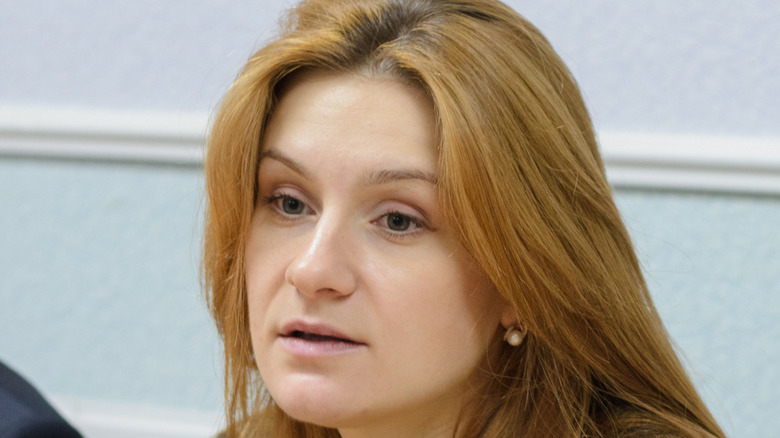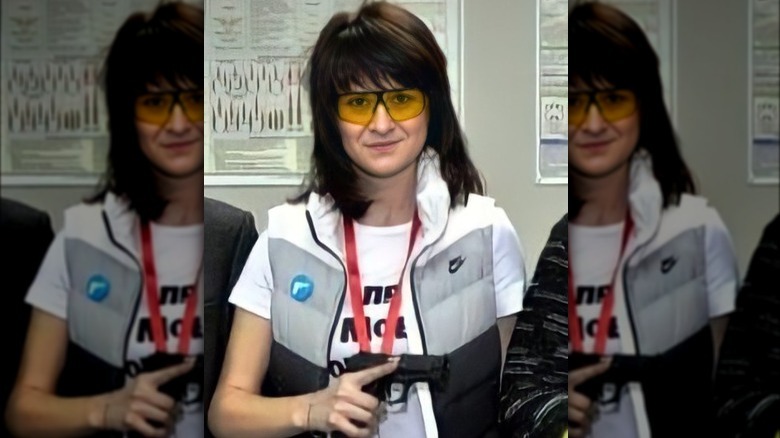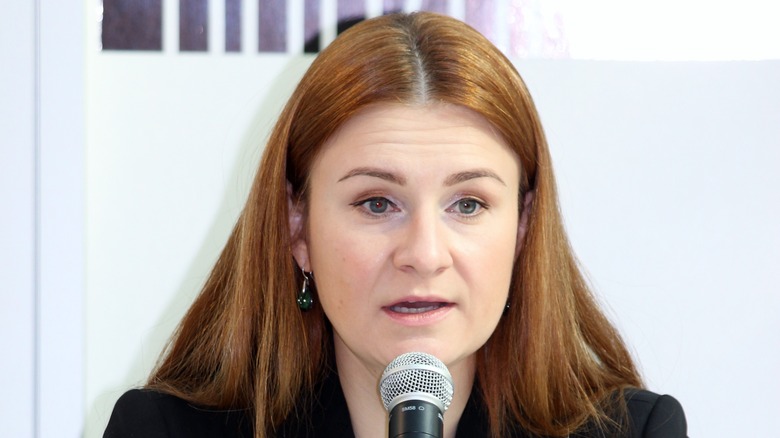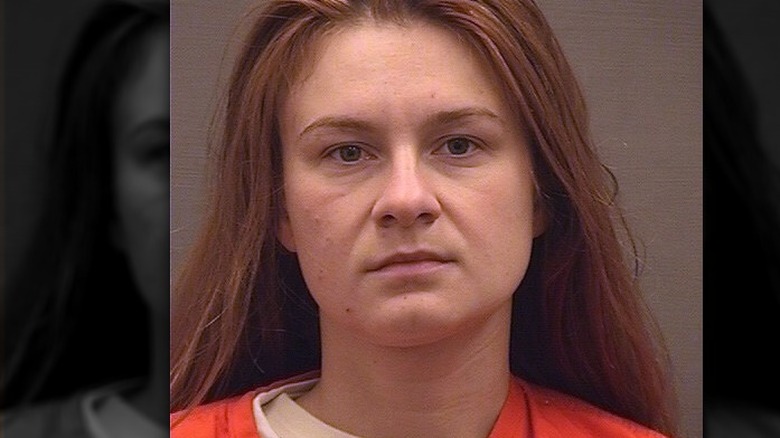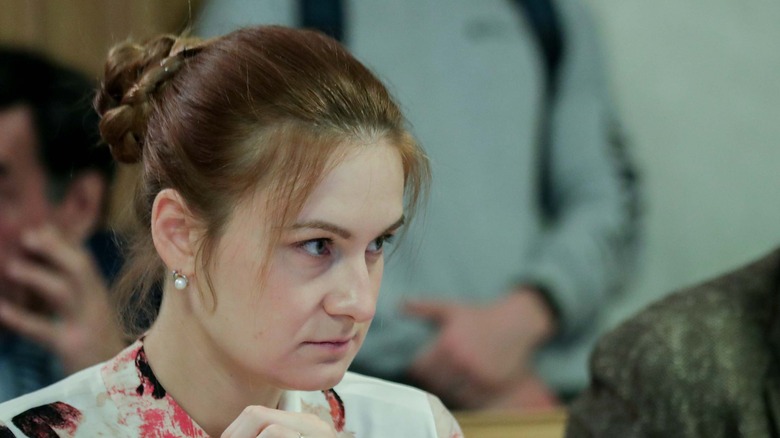How Long Did Former Russian Spy Maria Butina Spend In Prison?
The year 2016 was a wild ride for American politics. There were over 20 contenders for president, Twitter wars, fake news, and the ultimate political upset: Donald Trump over Hillary Clinton.
Underlying all of this was the resurrected specter of Cold War fears — Russian collusion. Although Robert Mueller's investigation found no evidence of collusion between Donald Trump's campaign and the Russian government (via American Bar Association), there was a Russian agent behind the scenes on American soil doing her best to work her way into Republican circles. Her name is Maria Butina and her plan was to use her connection to the National Rifle Association (NRA) to ingratiate herself to the Republican party and set up a back channel between it and the Kremlin (via Rolling Stone).
In July of 2018 she was arrested and charged with being a covert Russian agent. A year later she pled guilty to the charges and was sentenced to 18 months with time served (via The Daily Beast). She was released in October 2019, having served 15 months, and promptly deported to Russia.
Let's start at the beginning
Maria Valeryevna Butina was born in 1988 in Barnaul, a city in southern Siberia. From a young age she was introduced to guns, which continue to be a passion of hers. She ran an unsuccessful chain of furniture stores for a few years, then opened an advertising agency in Moscow (over 1,800 miles from her hometown) in 2011 (via GQ Russia).
That same year she founded the group Right to Bear Arms and became the face of gun rights in Russia by working as a tireless advocate. In this position she met high-ranking Russian politician Alexander Torshin (via The New Republic). The two began traveling to Washington, D.C. where Butina began to cultivate her relationship with the NRA.
The NRA returned Butina's affections and sent representatives to attend her annual gun conference in 2015 (one year after Russia's annexation of Crimea). It was on this trip that she met South Dakota Republican Paul Erickson (via Time). The two developed a relationship and in March of that year she wrote a document called the "Diplomacy Project" wherein she outlined her ambition to set up a backchannel between the Kremlin and the GOP (via Rolling Stone).
The plot thickens
The pair began moving money in late 2014. Butina sent $8,000 to Erickson and Erickson sent Butina over $50,000 in two accounts to help get her "special project" off the ground. In August 2016 she entered the U.S. via a student visa and enrolled at American University in Washington, D.C. (via BuzzFeed News).
Earlier that year, Bridges LLC was incorporated in South Dakota by Butina and Erickson, with Butina listed as the sole signer on its checking account. Erickson told McClatchy they started it as a way to finance Butina's studies. But in Butina's own words, the business was created as a way to get Vladimir Putin a TV show in the U.S. (via Rolling Stone).
Meanwhile, the Diplomacy Project is moving forward and a number of attempts are made to establish a backchannel between Donald Trump and the Kremlin via Butina's former boss, Alexander Torshin, now the Deputy Governor of Russia's central bank and also a lifetime member of the NRA. Torshin and Butina met with Donald Trump Jr. at the NRA's annual conference that year (via The New York Times).
The NRA has admitted it accepted dark money from Torshin but the amount has never been revealed. It is known that Torshin has been implicated in international money laundering and he was central to the FBI's investigation into whether the NRA used foreign money to finance their political spending (via Pacific Standard).
The law closes in
Not much is known of her activities in 2017, though she did attend the National Prayer Breakfast that year with Torshin. They were slated to meet Trump at the breakfast but the meeting was canceled at the last minute when Trump was informed of Torshin's ties to organized crime (via Vox).
Later that year, the Senate Intelligence Committee targeted the finances of Butina, Torshin, and Erickson for investigation. In December she declined a request to testify in front of the Senate Judiciary Committee (via BuzzFeed News).
In April 2018 Torshin was sanctioned by the Treasury Department. Later that month, Butina's apartment was raided by armed FBI agents. By June she was offering to assist prosecutors investigating Erickson. Finally in July she was arrested and charged with acting as an unregistered foreign agent (via CNN).
Three days after her arrest she pleaded not guilty in a preliminary hearing, according to Reuters. But by December she had worked out a deal with prosecutors and pleaded guilty to the charges (via The Washington Post). In April of 2019 she was sentenced to 18 months in federal prison with time served. She was released in October, having served 15 months, and deported the next day (via BBC).
Where is she today?
Less than two months after her return to Russia, Maria Butina got a job as the cohost of the "Beautiful Russia boo-boo-boo" YouTube channel as part of Russia Today's network (via TCH). According to The Daily Beast, since coming home she has written a memoir of her time in U.S. prison and self-identifies as a prison activist.
Last year she interviewed jailed Russian political activist Alexei Navalny for RT and took the opportunity to mock his incarceration, claiming that his prison was nicer than the hotels in the region where she grew up. Navalny never appeared on camera for the interview.
In October she was given a seat on the State Duma, the lower house of Russia's parliament. A local governor gave up his seat so Butina could fill it. Critics allege the seat was a gift for being a government mouthpiece, specifically for attempting to discredit Navalny, who was in the middle of a hunger strike when she interviewed him (via Business Insider).
She was most recently in the news for attempting to discredit the Ukrainian resistance to the Russian invasion. Rolling Stone reports that she told BBC radio that the Russian government does not bomb civilian populations, refusing to comment on who is bombing civilian targets.
